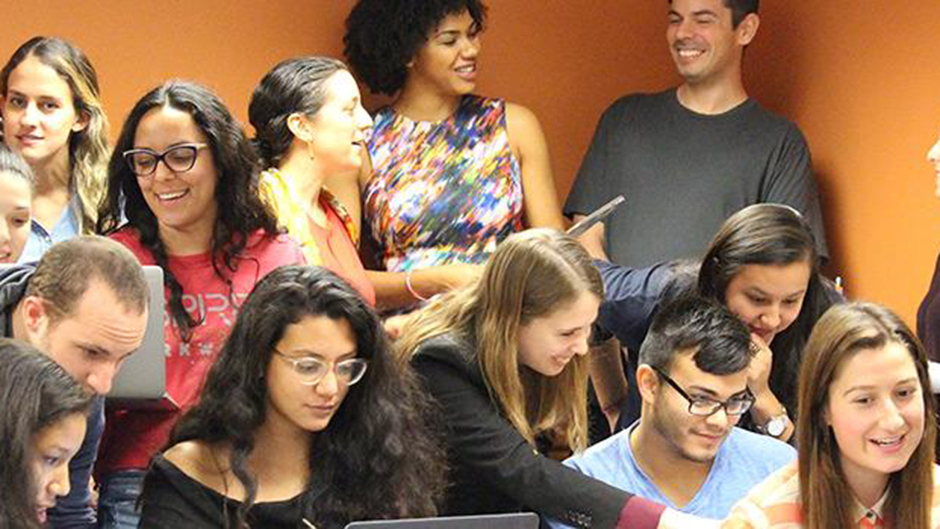Twenty-one law students from Professor Carrie Bettinger-López’s International Human Rights Law and Advocacy class teamed with South Florida anti-poverty organizations to produce six reports for the United Nations special rapporteur on extreme poverty and human rights.
Starting in August, the J.D. and LL.M. students worked with The Woman's Fund of Miami-Dade County, a non-profit dedicated to improving the lives of local women and girls; the Coalition of Immokalee Workers, a community organization championing the rights of Florida migrant farm workers; the ACLU of Florida; Legal Services of Greater Miami, which provides civil legal services for the poor in Miami-Dade and Monroe County; the Community Justice Project, a nonprofit organization comprised of community lawyers who collaborate with community organizers and low-income communities of color; Catholic Charities Legal Services, which provides immigration services to South Florida's refugee and immigrant community; and Catalyst Miami, an anti-poverty non-profit. The project was in collaboration with the law school’s Human Rights Clinic.
In preparation for a presentation before the U.N. Human Rights Council, the rapporteur, Philip Alston, a New York University law professor, will use the reports to supplement his official visits to several U.S. cities. Alston will present his findings on the interlinkages between U.S. poverty and the realization of human rights at the U.N. conference in Geneva in early 2018.
The six reports, which were submitted as a consolidated 73-page report, were drafted with the intention to draw Alston to Miami during his U.S. site visits December 4 to 15. Non-profits, activists, and academics across the country were invited to provide input to the special investigator detailing interlinkages between poverty and the realization of human rights in the U.S., and explaining why it is vital for him to visit specific parts of the country during his visit.
The reports highlighted numerous instances where local law and policy had a negative impact on poor people. For instance, one report, entitled Human Rights at Home: Miami’s Housing Crisis and its Perpetuation of Poverty, analyzed raw data collected by Legal Services of Greater Miami and the Community Justice Project to show how Florida’s rent deposit statute disparately impacts low-income people’s ability to defend themselves: even if a tenant has a sudden financial hardship to overcome or alleges legitimate concerns about housing conditions, that tenant must deposit all the unpaid rent into the court to even have the dispute heard. If tenants are too poor to deposit the rent, they may not get their day in court.
“These reports reflect dynamic partnerships between my students, working in collaboration with the Miami Law Human Rights Clinic, and leading regional public interest and social justice organizations, to address pressing matters of poverty in our community,” said Bettinger-López, director of the Human Rights Clinic. “The students learned a tremendous amount from the experience of working with these worthy organizations, and we hope the reports contribute to our collective fight for social and economic justice in our community.”
The Miami Law Human Rights Clinic works for the promotion of social and economic justice globally and in the U.S. The clinic uses international human rights laws and norms, domestic law and policy, and multidimensional strategies, such as community organizing, political activism, and global networking, to draw attention to human rights violations, develop practical solutions to those problems, and promote accountability on the part of state and non-state actors.
“Working on the report for the United Nations special rapporteur on extreme poverty, under the guidance of Professor Bettinger-Lopez and in partnership with the ACLU of Florida, was a process that started out as mere class project but quickly evolved into the work I am most proud of in law school,” said Luis Inclan, a second-year student.
“I learned that approximately 1.6 million people in the state of Florida cannot vote because of prior felony convictions, even after they have served their time,” Inclan said. “Tracing the complex underlying causes and historical background of felon disenfranchisement, as well as gathering data for the report, provided me with a practical and intellectually rewarding experience. I not only had the great privilege of playing a role in bringing more attention to this issue, but I also expanded my perception of what can be achieved through human rights advocacy.”

